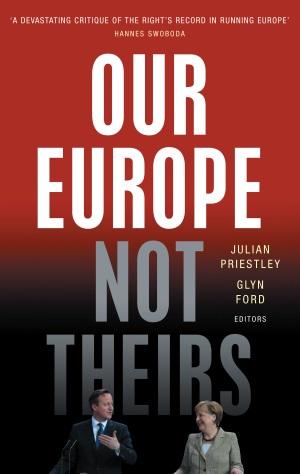 It has become a truism that the left in Europe is under going a profound period of crisis. Social democratic parties find themselves squeezed as the right, and, in some cases, the far right, have become the main beneficiaries of the financial crisis of 2008.
It has become a truism that the left in Europe is under going a profound period of crisis. Social democratic parties find themselves squeezed as the right, and, in some cases, the far right, have become the main beneficiaries of the financial crisis of 2008.
A perfect storm of resurgent nationalism – a rise in particular of resentment and fear towards ‘foreigners’ – and a political and economic architecture in Europe that has prioritised fiscal discipline and austerity over investment and economic cooperation, has also created a deep sense of crisis within European institutions. A possible British exit from the Eurozone is but one of multiple threats to the fabric of European unity.
Our Europe; Not Theirs, first published in 2013 but republished in a second edition this year to coincide with the referendum, offers a timely set of interventions with two overarching themes: to attack the record of the right’s record of governance in post-crisis Europe and promote an alternative vision to a failed neoliberal ideology.
The contributors comprise various British members of the European social democratic family, including current and former MEPs, leading figures within the Party of European Socialists, and Commission officials. Inevitably, this position within what one might call the mainstream left colours the authors’ analyses and policy prescriptions. But it reflects the extent of the rethinking going on amidst the crisis of the European social democratic parties that they offer a robust critique of the neoliberal status quo. In a British context, where political debate and, especially, the mainstream media, remain largely unaware of the arguments between left and right within the EU institutions, the book offers a thorough and wide ranging educational resource on the current European political landscape. This alone makes the book a valuable resource for those of a variety of left wing political persuasions.
Derek Reed authors the two stand out chapters of the volume. Across them he develops a critique, rooted in a survey of the empirical data, of the economic impact of austerity in EU states. Reed shows how in 2010 and early 2011 the European economic and labour market situation was actually recovering and proceeding at a similar pace to the US. However, from May 2011 stimulus was abandoned for austerity as ‘country after country tightened its fiscal belt, urged on the by the European Commission, while premature interest rate hikes from the European Central Bank added fuel to the fire’ (pp. 63 – 64). Reed provides a forensic examination of the bad economics behind this decision and its significant human and social cost.

Clamping down on tax avoidance and evasion is one of the key progressive potentials of the EU
If this provides the first element of his critique, the second examines the much-maligned structural architecture of the Eurozone itself. Since the financial crisis a number of scholars and commentators, including, for example, Paul Krugman in this widely shared blog post, have attacked the flawed and, still to this day, largely unreformed, structural assumptions built into the foundation of the single currency area. The lack of mechanisms to cope with asymmetrical shocks – when some regions go into recession while others do not – through common social security and taxation systems to redistribute wealth, has meant an exclusive focus on debt-based solutions with the neoliberal terms attached to these bailouts compounding the problem.
Reform of this system is a big and bold aim. But there is a developing debate in Europe about expanding the role of the EU in economic governance and increasing its budget to make possible a more re-distributional approach. Reed recognises that such proposals are anathema to Britain’s Europhobic and neoliberal Tory government (p. 83) but rightly sees the development of potentially popular measures to tackle social inequality as an essential means for the left to rebuild support for a European project.
Reed proposes a Europe-wide unemployment benefit, a coordinated framework for corporation tax to end the race to the bottom, which has seen the average EU rate fall from 35.3 per cent to 23.1 per cent between 1995 and 2011, and the implementation of the delayed financial transactions tax (pp. 83 – 84). These are relatively minimal but bold proposals that could start to overcome some of the structural problems in the Eurozone architecture by creating redistributive fiscal structures. But whether they are sufficient to tackle the longer-term challenges the ‘robot revolution’ poses to the labour market might be questioned. A Europe-wide Universal Basic Income, an unconditional payment made to all citizens, is both a more visionary proposal, which increases the bargaining power of the worker in the labour market by reducing the incentives to take on work paying poverty wages, and can overcome the tensions and resentments seen in many countries over the use of means-tested benefits. Its absence from a book of with this kind of ambition is therefore rather disappointing.

France has been in the grip of mass protests
Another focus of the book is on reclaiming the language of labour market reform for the progressive left by fighting for Europe-wide legislation to end insecure employment practices and boost workers’ rights (p.96). While this is more than welcome, it does expose the limits of a book so heavily focused on the need to bring the social democratic parties back to power in Europe. Given 2016 has seen another huge rebellion against a neoliberal labour market reform in France proposed by Francois Hollande’s Socialist Party, the claim that these parties have an agreed ‘alternative labour market agenda’ (p. 96) to Europe’s right could be questioned.
The extent to which the adoption of neoliberal policies by the social democratic parties has created the conditions for the new polarisation in Europe’s political landscape is tentatively suggested on occasion but not explicitly addressed. To their credit the new introduction drafted for the 2016 edition by Julian Priestley and Glyn Ford locates the rise of Jeremy Corbyn in the Labour Party in a generalised growth of ‘the left of the left’ in Europe with Britain’s peculiarity lying in how this took place within the social democratic party, not through the rise of an external challenger to it (p. 15). But there is a lack of sustained reflection on the factors involved in the crisis of social democracy, or potential tactical solutions to be utilised in an increasingly fragmented political landscape, such as support for progressive electoral alliances. Indeed, the book often appears a little out of sync with the these new times, and the way in which the decline of social democracy in the current conjuncture reflects dramatic cultural and technological changes that have unravelled the working class electoral base on which it relied for much of the post-war period. Neal Lawson’s recent obituary for social democracy ‘as we know it’, for example, stands at odds with the slightly business as usual tenor of some of these contributions, which arguably do not go far enough in rethinking the left’s vision in pluralist and postcapitalist terms.
Nonetheless, at a time when a degree of convergence is occurring between the radical and mainstream left, expressed most recently in the formation of an anti-austerity government in Portugal, the book’s focus on alternatives to neoliberalism will be welcomed as offering basis for collaboration with parties of Europe’s radical left.
***
Luke Cooper lectures in Politics at Anglia Ruskin University and is a spokesperson for the Another Europe Is Possible campaign.
8th June 2016
